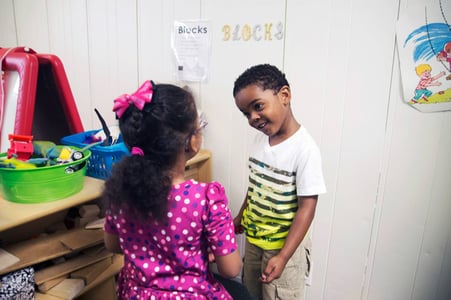
Social-emotional skills are key to student success. These skills include the ability to recognize and regulate emotions and behavior, take others’ perspectives, and make sound choices. Children who have good social-emotional skills have an easier time making friends and maintaining strong relationships with teachers and peers.
Not surprisingly, social-emotional skills provide children with the foundation they need to thrive in school. Many kindergarten teachers have told an anxious parent that they shouldn’t worry that their child doesn’t recognize all of their alphabet letters before they start school – they can teach that. It’s much better that children know how to interact with their peers and manage their behavior.
Research shows that the domain of Emotional Support is particularly important for promoting children’s social-emotional development. Emotional Support is related to increased social competence, positive engagement with teachers, improved inhibitory control, and decreased behavior problems and conflicts with teachers. Mashburn et al. (2008) looked at the association between social skills and quality, as measured by the CLASS. They examined data from 671 preschool teachers who completed behavioral rating scales on four children in their classrooms and compared these ratings to CLASS scores. They learned that children in classrooms with higher Emotional Support were rated as having higher social competence and lower levels of problem behaviors than were students in classrooms that provided less effective Emotional Support.
Using the same data set, Brock and Curby (2014) examined the effect of the consistency of teachers’ Emotional Support on teachers’ relationships with their students, as well as on their ratings of children’s social and behavioral skills. Findings showed that teachers in classrooms that provided more consistent Emotional Support reported closer relationships with their students. Furthermore, these teachers indicated that the children displayed more social competence and fewer problem behaviors. Interestingly, these same children were viewed as being more socially competent by their kindergarten teachers.
Social-emotional skills are just one aspect of a child’s “readiness” for school. Children who start kindergarten with well-developed social skills are better positioned to engage in activities, interact with their peers, and benefit from instruction – often with effects that can last a lifetime.
Citations:
Brock, L., & Curby, T.W. (2014). Emotional support consistency and teacher-child relationships forecast social competence and problem behaviors in prekindergarten and kindergarten. Early Education and Development, 25(5), 661-680,
Mashburn, A., Pianta, R., Hamre, B., Downer, J., Barbarin, O., Bryant, D., Burchinal, M., Early, D., & Howes, C. (2008). Measures of pre-k quality and children's development of academic, language and social skills. Child Development, 79 (3), 732-749.

